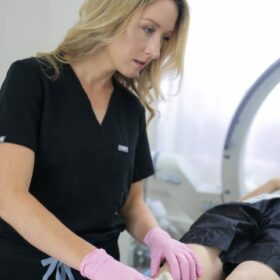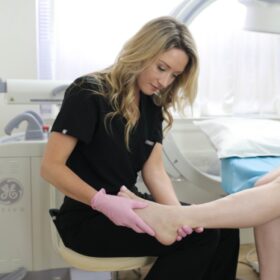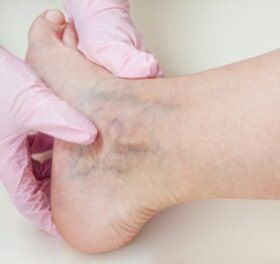When you think of heart problems, you may not immediately associate them with your legs. However, heart problems can indeed affect your legs. In this article, we will explain how heart problems can cause leg pain and other symptoms and what you can do about it.
At Vein Treatment Clinic, we specialize in diagnosing and treating vein-related issues such as varicose veins and spider veins. We understand the connection between heart health and vein health, and we want to educate our patients and readers on the topic.
The Link Between Heart Problems and Leg Pain
Heart problems, particularly those affecting blood vessels, can cause leg pain and other symptoms. The blood vessels in your legs are responsible for delivering oxygen and nutrients to the muscles and tissues in your lower extremities. When the blood vessels become narrow or blocked due to heart problems, it can lead to a condition called peripheral artery disease (PAD).
PAD is a condition in which the arteries that carry blood to your legs become narrow or blocked, leading to reduced blood flow. The reduced blood flow can cause pain, weakness, and cramping in your legs, particularly during physical activity. The condition is commonly known as “smoker’s leg” as smoking is a significant risk factor for developing PAD.
Common Causes of Heart Disease
Heart disease is a term used to describe several conditions that affect the heart, such as coronary artery disease, heart failure, and arrhythmia. There are several factors that increase the risk of developing heart disease, including:
- High blood pressure
- High cholesterol
- Smoking
- Obesity
- Lack of physical activity
- Family history of heart disease
- Diabetes
Chronic Venous Insufficiency (CVI) and Leg Pain
Chronic Venous Insufficiency (CVI) is a condition that affects the veins in the legs and occurs when the valves in the veins become weakened or damaged, leading to inefficient blood flow. The veins in your legs are responsible for transporting blood from your feet and legs back up to your heart. When these valves become damaged, they are unable to prevent blood from flowing back down into your legs, causing blood to pool in the veins and leading to symptoms like leg pain, swelling, and cramping.
CVI can affect people of all ages, but it is more common in those who are overweight, pregnant, or have a family history of the condition. Other factors that can contribute to the development of CVI include a sedentary lifestyle, smoking, and a history of blood clots. Your vein doctor can help you determine the best course of treatment based on the severity of your condition, your symptoms, and your overall health.
Symptoms of Chronic Venous Insufficiency
The symptoms of CVI can vary in severity and may include:
- Leg pain, especially after standing for long periods
- Swelling in the legs, ankles, or feet
- Aching, burning, or itching in the legs
- Cramping or throbbing in the legs
- Skin discoloration, particularly around the ankles
- Skin ulcers or sores, especially around the ankles
If you experience any of these symptoms, it’s important to seek medical attention. If left untreated, CVI can lead to skin infections, blood clots, and deep vein thrombosis.
Misdiagnosis of CVI
Symptoms of Chronic Venous Insufficiency (CVI) can be easily misattributed to other conditions such as aging, heart problems, or Peripheral Artery Disease (PAD). This can lead to a delay in diagnosis and treatment, causing unnecessary suffering for patients. The symptoms of CVI, including leg pain, swelling, and skin discoloration, are common complaints in older adults, and it’s easy for healthcare providers to attribute them to the aging process.
However, it’s important to note that the symptoms of CVI can occur at any age and are not necessarily related to aging. Leg pain and cramping are also common symptoms of PAD, a condition that affects the arteries in the legs. This can lead to confusion in diagnosis, as both CVI and PAD can cause similar symptoms. It’s important to consult vein doctors if you experience leg pain or cramping to determine the underlying cause of your symptoms.
Furthermore, CVI can also be misdiagnosed as a heart problem, as both conditions can cause leg swelling and fatigue. However, CVI affects the veins in your legs, while heart problems affect the arteries and can cause chest pain, shortness of breath, and other symptoms.
Treatment for Chronic Venous Insufficiency
The treatment for CVI depends on the severity of your condition. In mild cases, lifestyle changes such as exercising, losing weight, and avoiding prolonged standing or sitting may relieve symptoms. Compression stockings may also be recommended to improve blood flow in your legs. In more severe cases, minimally invasive procedures, such as endovenous laser ablation, radiofrequency ablation, and VenaSeal may be recommended. These procedures involve using heat, radiofrequency energy, or medical glue to close off the damaged veins and redirect blood flow to healthier veins.
At the Vein Treatment Clinic, we offer minimally invasive procedures for treating varicose veins and spider veins. These procedures are safe, effective, and require little to no downtime. Our board-certified vein doctors will diagnose the root cause of your vein problems using vascular imaging and duplex ultrasound and curate a personalized treatment plan to address your specific needs.
Contact us today to schedule an appointment and find relief from your leg pain.











